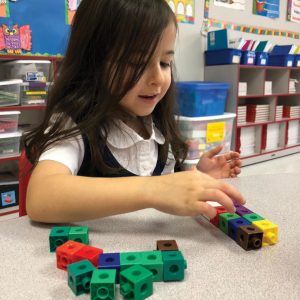 Philosopher Douglas Hofstader recalls a story when he was five. He had just learned the math fact 2+2=4. And he was tickled and smitten.
Philosopher Douglas Hofstader recalls a story when he was five. He had just learned the math fact 2+2=4. And he was tickled and smitten.
TWO two’s? He says, “This catchy phrase — two twos — sent thrills up and down my spine, because I realized that it involved applying the notion of “two to itself.”
He craved the unknown spectacle of a thing applied to itself and asked his mom if there were such a thing as three threes. His mom plucked the answer from that tree adults only have access to and gave him the apple: “Nine, sweety.”
This story illustrates the joy, ecstasy, and giddy curiosity at math facts overwhelming a child. It is this mysticism that grows a great foundation for math.
But let’s be clear about foundations. When you think of unmatched genius architecture, do you talk about the foundation or do you marvel at what comes above, what sprouts through like a bougainvillea. We think of the flower and the beauty, not its interiors.
This is crucial because while indeed, a weak foundation could cause an entire building to crash down to the earth leaving a jumbled mess in its place, it is this foundation that lays the work for true brilliance. Having first learned the math fact two twos, Hofstader set his mind upon the foundation, and wrapped it in delight and wonderment. Rome could not build the colosseum without first planting its bones.
Math fact fluency is the foundation. It is the ability to recall basic facts in all four operations with speed and accuracy.
Young children begin with counting objects and counting on their fingers, for example, indicating their age by holding up the same number of fingers on their hands. By equating the number “two” to two fingers, they are understanding this concept both visually and kinetically.
This is important to solidify the “how” of adding, subtracting, multiplying and dividing digits. Through frequent and repetitive practice, the facts become committed to memory.
The practice needn’t be monotonous. Math facts are each themselves memory games, and jeopardy style adventures can and should be used to defuse the protruding sense of boredom that can suffocate a desire to learn math facts. How else can I turn those ZZZ’s into A’s?
Roll two die and ask for the sum, the difference, the product, or the quotient.
Play math bingo.
Have a math scavenger hunt.
Children are designed to be delightfully confounded by the world. This is curiosity and without foundational math facts, math is nothing to be curious about.
We should leverage that natural desire to wonder and want, instead of focusing solely on the roteness of math facts. Wisdom is knowledge plus experience, and a love of math is math facts plus curiosity. Math to prove the why of math. Very circular. A thing applied to itself, as Philosopher Hofstader would say.
Self Development Academy’s philosophy includes the “Four R’s”: respect, responsibility, readiness, and resilience. The importance of laying early foundations through math is identifiable specifically within the concept of one of the “Four R’s,” readiness — be ready!
Without a strong foundation in math facts, children can experience roadblocks to problem solving and difficulty with higher, more complex mathematical concepts. Confusion can occur, and math can become dreadful, cumbersome, and time consuming, which lead to children experiencing defeat and math anxiety.
Most importantly, without this foundation, a relationship with math fails. Children are designed to be delightfully confounded by the world. This is curiosity, and without foundational math facts, math is nothing to be curious about. Math will be that class avoided due to a regrettable disenchantment. Regrettable and preventable!
As parents, we want the best for our children, and assisting a child to build a strong foundation for education, while simultaneously instilling a love of learning, is truly and sincerely an act of intentional readiness. Remember, math facts are more than the facts. It is the earth from which we touch the sky.
If you want to learn more about helping your child develop a love of learning math, call us at Self Development Academy, (480) 641-2640. Exceptional futures start here.

